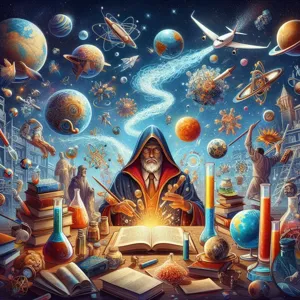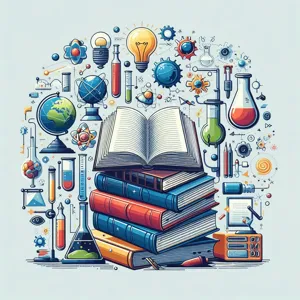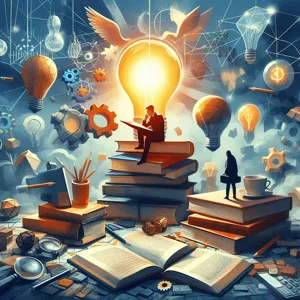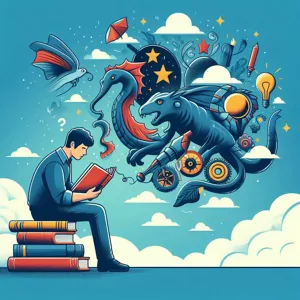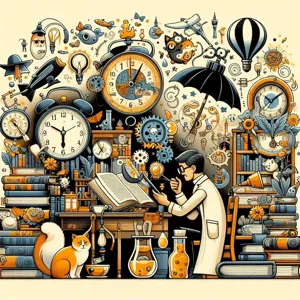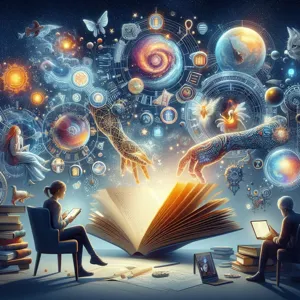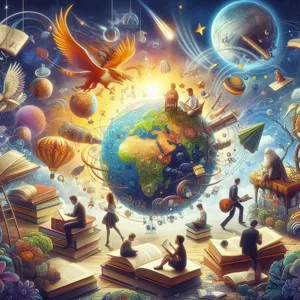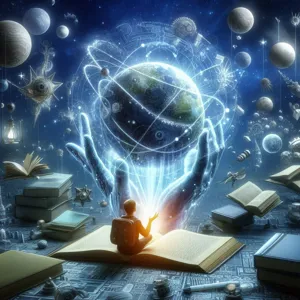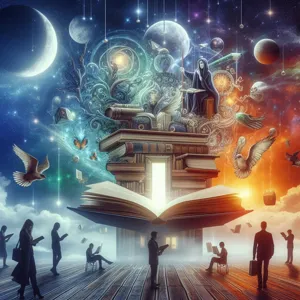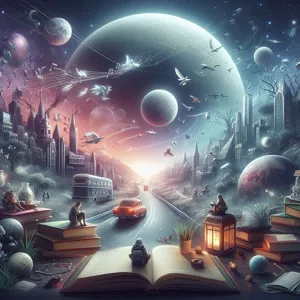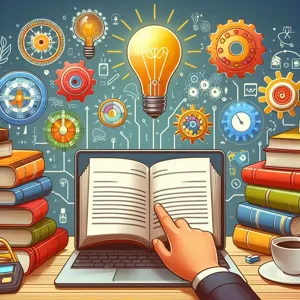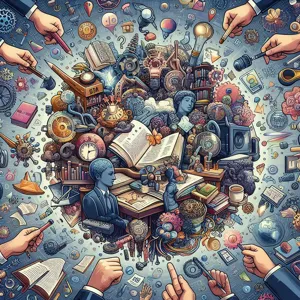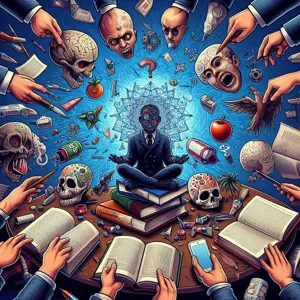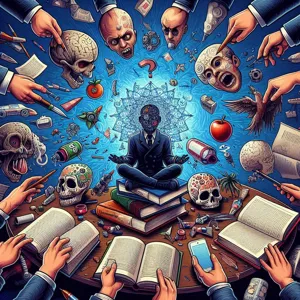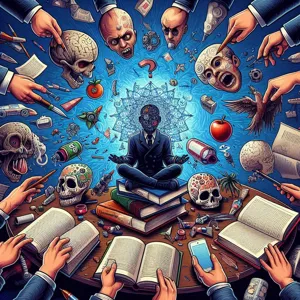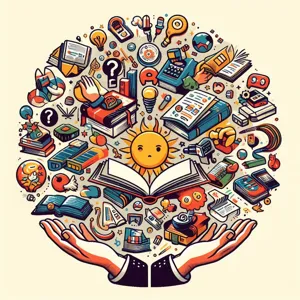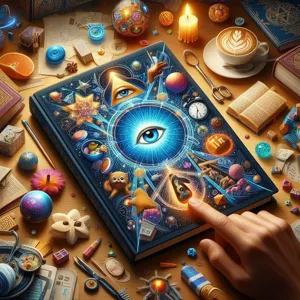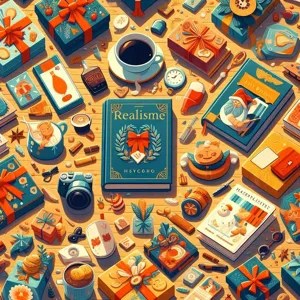In a world that often feels overwhelming and chaotic, nurturing our mental health and well-being has never been more crucial.
Books possess a unique power to transport us, challenge our perspectives, and provide solace when we need it most. Whether you’re seeking guidance through anxiety, looking for inspiration to cultivate resilience, or hoping to explore the depths of human emotion, the right book can be a transformative companion on your journey to mental wellness. In this post, we’ll explore the top 10 life-changing books that not only delve into the complexities of mental health but also offer practical tools and insights for enhancing your overall well-being. From insightful memoirs to groundbreaking self-help guides, these selections promise to inspire, educate, and empower you to live your best life, one page at a time. Join us as we uncover the literary gems that can illuminate your path toward a healthier, happier you.
1. Introduction: The Power of Reading for Mental Health
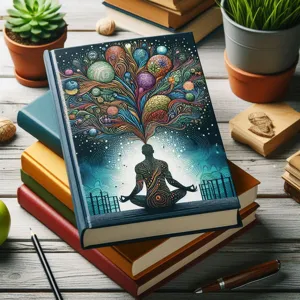
In a world that often feels overwhelming, the written word holds an extraordinary power to heal, inspire, and transform. Reading is not just a pastime; it can be a powerful tool for enhancing mental health and overall well-being. Engaging with books allows us to escape from the stresses of daily life and immerse ourselves in different perspectives, emotions, and experiences. It can provide solace in times of despair and ignite motivation when we feel stagnant.
The act of reading stimulates our minds, promoting cognitive function and emotional intelligence. Whether it’s fiction that transports us to fantastical realms or non-fiction that offers practical advice and insights, literature has the unique ability to resonate with our innermost thoughts and feelings. Through the pages of a book, we can confront our fears, challenge our beliefs, and discover new ways of thinking.
Moreover, studies have shown that reading can reduce stress levels, improve empathy, and boost self-esteem. It serves as a form of self-care, offering moments of reflection and mindfulness that are essential for maintaining mental health. As we delve into the following life-changing books, you’ll find a curated selection that not only nurtures the mind but also nurtures the soul. Each title has the potential to inspire change, foster resilience, and ultimately enhance your mental well-being. So grab a cup of tea, find a cozy nook, and prepare to embark on a transformative journey through the power of reading.
2. Criteria for Selecting Life-Changing Books
When it comes to discovering books that can truly transform your mental health and well-being, it’s essential to have a clear set of criteria for selection. Not all self-help or wellness titles are created equal, and knowing what to look for can make all the difference in your reading journey. Here are the key factors to consider when selecting life-changing books:
1. **Author Expertise**: Look for authors who possess credentials or extensive experience in the field of mental health, psychology, or wellness. This could include licensed therapists, psychologists, or individuals who have a proven track record of helping others. Their insights and advice are more likely to be grounded in research and genuine understanding.
2. **Evidence-Based Content**: The best life-changing books often incorporate evidence-based practices. Check if the book references scientific studies, psychological theories, or practical applications that are backed by research. This will ensure that the strategies suggested are not only effective but also reliable.
3. **Relatability and Personal Stories**: Books that share personal anecdotes or stories can be powerful. They allow readers to connect with the material on a deeper level, often seeing themselves in the experiences of others. This relatability can foster a sense of community and understanding, making the lessons more impactful.
4. **Practical Applications**: A great book should offer actionable steps that readers can implement in their daily lives. Look for titles that provide exercises, worksheets, or guided practices that encourage self-reflection and growth. These practical tools can facilitate meaningful change and help integrate the concepts into everyday routines.
5. **Positive Reviews and Recommendations**: Consider the feedback from other readers. Look for books that have garnered positive reviews from reputable sources or have been recommended by trusted figures in the mental health community. Peer recommendations can often lead you to hidden gems that you might otherwise overlook.
6. **Writing Style and Engagement**: The way a book is written can greatly affect your ability to absorb its messages. Seek out authors who have a conversational and engaging writing style. An approachable tone can make complex ideas easier to digest and keep you motivated to keep reading.
7. **Diversity of Perspectives**: Mental health and well-being can be experienced differently across cultures and backgrounds. Selecting books that offer diverse perspectives can enrich your understanding and provide a broader range of strategies for improving your mental health.
By using these criteria as a guide, you can curate a reading list that not only enhances your knowledge but also empowers you to take actionable steps toward a healthier, more fulfilling life. Remember, the right book at the right time can be a catalyst for profound change, setting you on a path toward greater mental well-being.
3. Book 1: “The Power of Now” by Eckhart Tolle
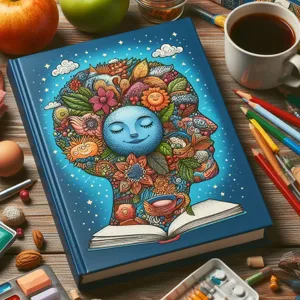
### 3. Book 1: “The Power of Now” by Eckhart Tolle
In a world that often feels chaotic and overwhelming, Eckhart Tolle’s “The Power of Now” emerges as a beacon of clarity and peace. First published in 1997, this transformative guide invites readers to step away from the incessant chatter of the mind and embrace the profound beauty of the present moment. Tolle, through his insightful prose, teaches us that the root of much of our suffering lies in our tendency to dwell on the past or worry about the future.
At the heart of Tolle’s message is the idea that true happiness and fulfillment can only be found by anchoring ourselves in the present. He skillfully dissects the nature of the ego, illustrating how it perpetuates feelings of anxiety and discontent by creating a false sense of self. Readers are guided through practical exercises and meditative practices designed to cultivate mindfulness, allowing them to experience life with fresh eyes and an open heart.
The book’s accessible language and profound insights make it a compelling read for anyone seeking to enhance their mental health. Tolle encourages us to observe our thoughts without judgment, fostering a deeper understanding of ourselves and our emotional landscapes. This practice of mindfulness can lead to reduced stress and improved emotional regulation, making “The Power of Now” an invaluable resource for personal growth.
Moreover, Tolle emphasizes the importance of acceptance and surrender, teaching that embracing the present moment—no matter how challenging—can lead to a deeper sense of peace and resilience. As you journey through the pages of this life-changing book, you’ll find yourself equipped with the tools to break free from the cycles of negative thinking and discover a more fulfilling, present-centered existence. For anyone looking to enhance their mental well-being, “The Power of Now” is not just a read; it’s a transformative experience that can reshape your approach to life itself.
4. Book 2: “Atomic Habits” by James Clear
“Atomic Habits” by James Clear stands out as a transformative guide for anyone looking to improve their mental health and overall well-being through the power of habit formation. In this insightful book, Clear provides a comprehensive framework for building good habits and breaking bad ones, emphasizing that small changes can lead to remarkable results over time.
Clear’s premise is simple yet profound: rather than relying on sheer willpower or motivation, we should focus on making tiny adjustments that are easy to implement. He introduces the concept of “atomic habits,” which are the small, incremental changes that, when compounded, significantly impact our lives. This approach is particularly beneficial for mental health, as it encourages readers to take manageable steps towards self-improvement without overwhelming themselves.
Throughout the book, Clear shares practical strategies, such as the Four Laws of Behavior Change—make it obvious, make it attractive, make it easy, and make it satisfying. By applying these principles, readers can cultivate positive habits that contribute to a healthier mindset, reduce anxiety, and enhance their overall quality of life.
Moreover, “Atomic Habits” is filled with relatable anecdotes and scientific research, making it both engaging and informative. It invites readers to reflect on their daily routines and offers actionable advice that can lead to profound, lasting change. Whether you’re looking to establish a morning routine, improve your productivity, or develop a consistent self-care practice, this book serves as a valuable resource for anyone on the journey to better mental health and well-being. In essence, “Atomic Habits” is not just a book about habits; it’s a blueprint for creating a life that is more intentional, fulfilling, and ultimately, happier.
5. Book 3: “The Happiness Project” by Gretchen Rubin
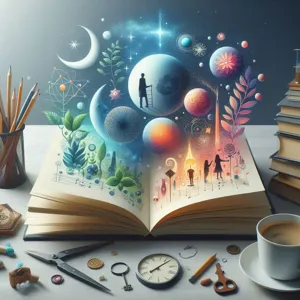
**Book 3: “The Happiness Project” by Gretchen Rubin**
In “The Happiness Project,” Gretchen Rubin embarks on a year-long journey to discover what it truly means to live a happier life. Through her insightful and relatable narrative, she shares the lessons she learns as she experiments with various strategies designed to boost her overall well-being. The book is both a memoir and a self-help guide, offering readers a unique blend of personal anecdotes and practical advice.
Rubin’s project is grounded in the belief that happiness is not just a fleeting emotion but a skill that can be cultivated with intention and effort. She divides her year into monthly themes, focusing on different aspects of happiness such as mindfulness, gratitude, and relationships. Each month, she sets specific goals and tracks her progress, revealing the ups and downs of her pursuit. This structured approach serves as a roadmap for readers looking to enhance their own lives.
One of the book’s most appealing qualities is Rubin’s authenticity. She openly shares her struggles and triumphs, making her journey feel accessible and relatable. Whether it’s finding joy in everyday moments or learning to let go of the things that weigh her down, her experiences resonate with anyone who has ever sought to improve their mental health.
“The Happiness Project” is not just about grand gestures; it emphasizes the small, everyday choices that contribute to a more fulfilling life. Rubin encourages readers to identify what brings them joy and to make space for those things, whether it’s spending time with loved ones, pursuing hobbies, or practicing self-care. Her insights, combined with practical tips and actionable advice, empower readers to embark on their own happiness projects, making it an essential read for anyone looking to elevate their mental well-being.
In a world that often prioritizes busyness over happiness, Rubin’s book serves as a gentle reminder that joy can be found in the simplest of moments. Her relatable storytelling and practical strategies make “The Happiness Project” a beacon of hope for those seeking to enhance their mental health and create a life filled with purpose and joy.
6. Book 4: “Mindset: The New Psychology of Success” by Carol S. Dweck
**Book 4: “Mindset: The New Psychology of Success” by Carol S. Dweck**
In “Mindset: The New Psychology of Success,” psychologist Carol S. Dweck presents a transformative approach to understanding how our beliefs about ourselves can shape our lives. At the heart of Dweck’s groundbreaking work is the distinction between two fundamental mindsets: the fixed mindset and the growth mindset.
A fixed mindset, as Dweck describes, is the belief that our abilities and intelligence are static traits that cannot be changed. This perspective often leads to a fear of failure, as individuals with this mindset might avoid challenges and shy away from opportunities that could lead to growth. In contrast, a growth mindset embraces the idea that our abilities can be developed through dedication, effort, and learning from setbacks. This shift in perspective is not just a matter of optimism; it fundamentally impacts how we approach our goals, relationships, and overall well-being.
Dweck’s compelling research and real-life examples illuminate how adopting a growth mindset can lead to greater resilience, increased motivation, and ultimately, a more fulfilling life. The book encourages readers to reframe their thinking, embrace challenges, and view failures as opportunities for learning rather than as roadblocks. By integrating the principles of a growth mindset into daily life, individuals can cultivate a more positive self-image and enhance their mental health, leading to improved performance in various aspects of life.
Whether you’re a student, a professional, or someone seeking personal development, “Mindset” offers valuable insights that can empower you to break free from self-imposed limitations. Dweck’s engaging writing style and practical exercises make this book not only enlightening but also actionable. As you delve into its pages, you’ll find yourself inspired to embrace a journey of growth and transformation, fostering the resilience necessary for mental well-being and success.
7. Book 5: “The Gifts of Imperfection” by Brené Brown
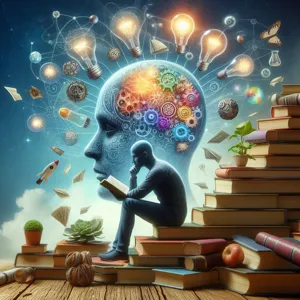
### 7. Book 5: “The Gifts of Imperfection” by Brené Brown
In “The Gifts of Imperfection,” Brené Brown invites readers on a transformative journey toward embracing authenticity and cultivating self-worth. This groundbreaking work delves into the pervasive societal pressures that drive us to pursue perfection—a futile chase that often leads to feelings of inadequacy and self-doubt. Brown, a renowned researcher and storyteller, shares her insights with warmth and vulnerability, encouraging readers to let go of the need for perfection and instead embrace their true, imperfect selves.
The book is structured around ten guideposts, each offering practical strategies to help individuals shed the weight of societal expectations and cultivate a life rooted in courage, compassion, and connection. Brown emphasizes the importance of self-compassion as a vital tool in overcoming feelings of unworthiness. Through relatable anecdotes and evidence-based research, she illustrates how embracing our flaws can lead to a more fulfilling and meaningful existence.
One of the most impactful messages of the book is the idea that vulnerability is not a weakness but a source of strength. Brown encourages readers to lean into their vulnerabilities, recognizing that it is through these moments of openness that we foster genuine connections with others. The book serves as a reminder that everyone grapples with imperfection, and by sharing our stories, we can create a supportive community that celebrates authenticity.
Whether you’re seeking to improve your mental health, nurture your well-being, or simply find solace in the shared experience of being human, “The Gifts of Imperfection” is a powerful guide to living a more authentic, compassionate, and joyful life. With its rich insights and actionable advice, this book is a must-read for anyone looking to embrace their imperfections and cultivate a deeper sense of self-acceptance.
8. Book 6: “Feeling Good: The New Mood Therapy” by David D. Burns
David D. Burns’ “Feeling Good: The New Mood Therapy” is a transformative read that delves deep into the realm of cognitive behavioral therapy (CBT), offering practical tools for those seeking to improve their mental health. This book stands out for its accessible language and relatable examples, making it a staple for individuals grappling with depression, anxiety, or negative thought patterns.
Burns, a renowned psychiatrist, introduces readers to the concept that our thoughts directly influence our feelings. Through this lens, he guides readers in identifying and challenging cognitive distortions—those pervasive, often subconscious, negative beliefs that can cloud our judgment and exacerbate feelings of hopelessness. With exercises and worksheets peppered throughout the chapters, readers are invited to actively engage with the material, fostering a sense of empowerment as they begin to reshape their thought processes.
One of the book’s most impactful aspects is its emphasis on self-compassion. Burns encourages readers to recognize the importance of treating themselves with the same kindness and understanding they would offer a friend in distress. This shift in perspective can be a game-changer, helping individuals to move away from self-criticism and towards a more nurturing inner dialogue.
“Feeling Good” isn’t just theoretical; it is a practical guide that equips readers with skills to combat their emotional struggles. Whether you’re seeking a deeper understanding of your moods or simply looking for effective coping strategies, this book serves as a valuable resource on the journey to better mental health and well-being. With its blend of scientific insight and empathetic guidance, Burns’ work has the potential to illuminate paths to healing and resilience, making it a must-read for anyone invested in enhancing their emotional landscape.
9. Book 7: “The Body Keeps the Score” by Bessel van der Kolk
**9. Book 7: “The Body Keeps the Score” by Bessel van der Kolk**
In “The Body Keeps the Score,” renowned psychiatrist Bessel van der Kolk delves deep into the profound connection between our minds and bodies, revealing how trauma can manifest physically and emotionally. This groundbreaking work has become a cornerstone in the field of mental health, offering readers an enlightening perspective on how past experiences shape our present behavior and overall well-being.
Van der Kolk draws from decades of research and clinical practice, weaving together compelling case studies that illustrate the different ways trauma can disrupt our lives. He explains how our bodies store memories of traumatic events, leading to a range of symptoms that can include anxiety, depression, and chronic pain. With a compassionate voice, he encourages readers to recognize that healing is not just a cognitive process, but one that requires a holistic approach, engaging both the mind and the body.
Through innovative treatments like EMDR (Eye Movement Desensitization and Reprocessing), yoga, and neurofeedback, the book offers practical tools for reclaiming control over one’s life. Van der Kolk emphasizes the importance of creating a safe environment and nurturing connections, which can significantly aid in the healing process.
Whether you are a survivor of trauma seeking understanding, a mental health professional looking to enhance your practice, or someone simply interested in the complexities of the human experience, “The Body Keeps the Score” is a transformative read. It empowers readers to confront their pasts and ultimately reclaim their narratives, underscoring the vital message that while trauma can alter our lives, it does not have to define us. This book is a must-read for anyone on a journey toward mental health and holistic well-being, as it not only enlightens but also inspires hope for recovery and renewal.
10. Book 8: “Daring Greatly” by Brené Brown
In “Daring Greatly,” Brené Brown invites readers to embrace vulnerability as a source of strength rather than a weakness. This transformative book explores the profound impact of vulnerability on our lives, relationships, and overall well-being. Brown, a renowned researcher and thought leader on topics such as courage, shame, and empathy, draws on her extensive studies to demonstrate that the willingness to be vulnerable can foster deeper connections and cultivate a sense of belonging.
At the heart of the book is the idea that daring to show up and be seen, even when the outcome is uncertain, opens the door to living a more authentic life. Brown shares compelling anecdotes and research-backed insights, illustrating how embracing vulnerability can lead to personal growth, healthier relationships, and greater resilience in the face of adversity. She challenges the societal norms that equate vulnerability with weakness, encouraging readers to let go of the armor they wear to protect themselves and to lean into the discomfort that often accompanies growth.
“Daring Greatly” serves as a powerful reminder that our willingness to engage with our fears and insecurities not only empowers us but also inspires those around us. It offers practical strategies for cultivating vulnerability in everyday life, from fostering open communication in relationships to creating a culture of trust within organizations. Whether you are struggling with self-doubt, seeking deeper connections, or simply looking to enhance your emotional well-being, this book challenges you to step into the arena of life with courage and compassion. With its blend of heartfelt narratives and actionable insights, “Daring Greatly” has the potential to be a catalyst for profound change, encouraging readers to embrace their true selves and live wholeheartedly.
11. Book 9: “Man’s Search for Meaning” by Viktor E. Frankl
**Book 9: “Man’s Search for Meaning” by Viktor E. Frankl**
Viktor E. Frankl’s “Man’s Search for Meaning” is not just a book; it’s a profound exploration of the human spirit and a testament to the resilience of the mind. Written from the harrowing experiences of Frankl, a Holocaust survivor and psychiatrist, the book intertwines his personal narrative with psychological insights that reveal the fundamental quest for meaning in life, even amidst suffering.
In the first half of the book, Frankl recounts his harrowing experiences in Nazi concentration camps, detailing the dehumanization and despair that he and countless others faced. Yet, amid the horror, Frankl found that those who could find meaning in their suffering were more likely to survive. This pivotal realization forms the crux of his philosophy: that life can hold meaning under any circumstances, and it is our responsibility to discover that meaning for ourselves.
The second half delves into Logotherapy, Frankl’s groundbreaking psychotherapeutic approach that emphasizes the importance of purpose and meaning in mental health. Through practical examples and compelling anecdotes, he illustrates how individuals can reclaim their sense of purpose, regardless of their external circumstances. Frankl argues that even in the most challenging situations, we possess the freedom to choose our attitude and response, which ultimately shapes our well-being.
“Man’s Search for Meaning” is more than just a memoir; it’s a guide to navigating life’s challenges with strength and resilience. It encourages readers to reflect on their own lives, urging them to consider what gives them purpose. Whether you are seeking to overcome adversity or simply looking for a deeper understanding of life’s complexities, Frankl’s insights offer invaluable wisdom. This book has the power to shift perspectives, enhance mental health, and inspire individuals to seek fulfillment in every moment.
12. Book 10: “You Are Here: Discovering the Magic of the Present Moment” by Thich Nhat Hanh
In “You Are Here: Discovering the Magic of the Present Moment,” the revered Zen master Thich Nhat Hanh invites readers on a transformative journey of mindfulness and presence. This powerful book is more than just a guide; it’s a gentle reminder that the present moment is where life truly happens, and it holds the key to profound peace and happiness.
Thich Nhat Hanh, renowned for his ability to convey complex spiritual concepts in clear and accessible language, weaves together personal anecdotes, meditative practices, and insightful reflections. Through his teachings, he encourages readers to cultivate an awareness of their thoughts and feelings, fostering a deeper connection to themselves and the world around them. Each page serves as a call to slow down and embrace the beauty of the here and now, helping to alleviate the anxieties that often stem from dwelling on the past or worrying about the future.
The book is structured around simple yet profound exercises that can be easily integrated into daily life. From mindful breathing to walking meditations, Hanh offers practical tools that empower readers to reconnect with their senses, appreciate the small joys, and develop a state of calm amidst the chaos of modern living. His soothing prose is interspersed with beautiful illustrations that further emphasize the serenity of being present, making the reading experience not just enlightening but visually uplifting as well.
“You Are Here” is a beacon of hope for anyone seeking solace in a fast-paced world. It reminds us that the magic of life unfolds in the present moment, urging us to embrace mindfulness as a way to enhance our mental health and overall well-being. As you turn the pages, you may find yourself inspired to shift your perspective, allowing the transformative power of now to enrich your life in ways you never thought possible. This book is an essential addition to any wellness library, serving as a timeless guide to living more fully and joyfully in each moment.
13. How to Incorporate Reading into Your Daily Routine
Incorporating reading into your daily routine can be one of the most rewarding habits you develop, especially when it comes to enhancing your mental health and well-being. The key is to create a seamless integration of reading into your everyday life, turning it into a cherished ritual rather than a chore.
Start small by setting aside just 10–15 minutes a day—perhaps during your morning coffee or right before bed. This brief window can serve as a refreshing pause in your day, allowing you to escape into a different world or gain valuable insights that resonate with your experiences. Keep a book by your bedside or in your bag, so it’s always within reach, ready to fill those spare moments—whether you’re waiting for an appointment, commuting, or unwinding at home.
Another effective method is to establish a dedicated reading time. It could be during lunch breaks, where you can indulge in your favorite book while enjoying your meal, or perhaps during the evening, as a way to wind down after a long day. This ritual can signal to your mind it’s time to relax and absorb new ideas, allowing you to enter a more peaceful state.
Consider joining a book club or an online community centered on reading and mental health literature. This not only holds you accountable for your reading goals but also opens the door to enriching discussions and shared experiences. Engaging with others fosters a sense of connection and can deepen your understanding of the material.
Lastly, don’t hesitate to explore various formats. Audiobooks can be an excellent alternative, allowing you to absorb content while doing chores, exercising, or even during your commute. This flexibility can help you consume more literature, making reading an integral part of your lifestyle.
By thoughtfully weaving reading into your daily routine, you not only cultivate a habit that enhances your mental well-being but also embark on a journey of self-discovery and growth that will enrich your life in countless ways.
14. Additional Resources for Mental Health and Well-Being
In addition to the transformative power of books, there is a wealth of resources available to support and enhance your mental health and well-being. These additional tools can complement your reading journey, providing diverse perspectives and practical strategies for self-care and personal growth.
**Podcasts and Audiobooks:** For those who prefer auditory learning, mental health podcasts are a treasure trove of information and inspiration. Programs like “The Happiness Lab” and “Unlocking Us” delve into psychological research and personal stories, offering practical tips that you can easily integrate into your daily life. Similarly, audiobooks of the titles mentioned in this list allow you to absorb valuable insights while multitasking—whether you’re commuting, exercising, or simply winding down.
**Online Courses and Workshops:** Websites like Coursera and Udemy offer courses specifically focused on mental health topics, ranging from mindfulness meditation to cognitive behavioral strategies. Engaging in these structured learning experiences can provide you with tools and techniques to enhance your emotional resilience and well-being.
**Support Groups and Forums:** Connection with others who share similar experiences can be incredibly healing. Online platforms like Reddit and specialized forums allow individuals to discuss their mental health journeys, share coping strategies, and find community support. Additionally, local groups and workshops can foster a sense of belonging and understanding.
**Mobile Apps:** The digital age has birthed an array of mobile applications designed to promote mental well-being. Apps like Headspace and Calm provide guided meditations, sleep aids, and mindfulness exercises, making it easier than ever to incorporate self-care into your routine. Others, such as Moodfit and Happify, offer mood tracking and activities aimed at boosting mental health.
**Professional Help:** Lastly, while self-help resources are invaluable, they should never replace professional guidance when needed. Therapists and counselors can offer personalized support tailored to your unique circumstances. Many now provide virtual sessions, making mental health care more accessible than ever.
By exploring these additional resources, you can create a well-rounded approach to your mental health journey. Remember, enhancing your well-being is not a one-size-fits-all process; it’s about finding what resonates with you and integrating those elements into your life. Embrace this opportunity to learn, connect, and grow, ultimately leading to a more fulfilling and balanced existence.
15. Conclusion: Transform Your Life Through Literature
In conclusion, literature possesses an unparalleled power to transform lives, particularly when it comes to mental health and well-being. The books we’ve explored in this list are not just pages bound together; they are gateways to new perspectives, sources of comfort, and catalysts for personal growth. Each author weaves their unique experiences and insights into narratives that can resonate deeply with readers, offering solace in times of struggle and inspiration in moments of doubt.
As you embark on your journey through these life-changing texts, remember that the act of reading itself is an exercise in self-care. Carving out time to immerse yourself in a compelling story or to ponder profound concepts can be a form of meditation, allowing you to step back from the chaos of everyday life. The wisdom gleaned from these pages can empower you to confront your challenges with renewed vigor, cultivate resilience, and foster a deeper understanding of yourself and others.
Let these books be your companions as you navigate the complexities of life. Whether you seek strategies for managing anxiety, tools for enhancing your emotional intelligence, or simply a comforting narrative to escape into, there’s a transformative gem waiting for you in this curated collection. So, pick up a book, find a cozy nook, and allow the words to wash over you, guiding you on the path to a healthier, more fulfilling existence. Remember, change starts within, and sometimes, all it takes is the right book to ignite that transformative journey. Happy reading!
As we conclude our exploration of the top 10 life-changing books for enhancing your mental health and well-being, we hope you feel inspired to embark on a transformative literary journey. Each of these titles offers unique insights and practical tools that can empower you to cultivate resilience, foster self-compassion, and embrace a more fulfilling life. Whether you seek solace in the pages of a memoir, practical strategies from a self-help guide, or profound wisdom from a psychological perspective, these books are invaluable companions on your path to well-being. We encourage you to pick one up, dive in, and allow the words to resonate within you. Remember, investing in your mental health is one of the most profound gifts you can give yourself, and the right book could be just the catalyst you need for positive change. Happy reading!







